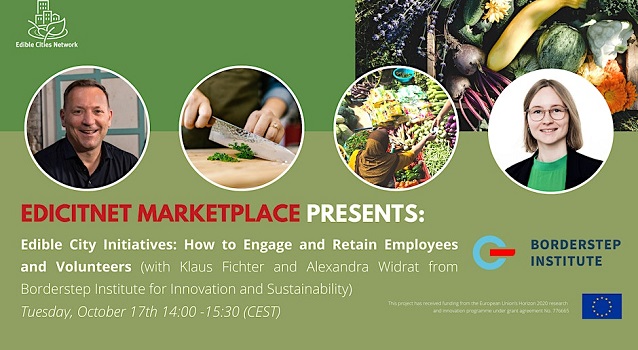Edible City Initiatives: How to Engage and Retain Employees and Volunteers
A good team creates the foundation needed to build a successful edible city initiative or business. Finding the right people, whether employees or volunteers, and engaging them are important considerations. In this workshop, you will learn about strategies of recruiting, engaging and retaining employees as well as volunteers.
In the interactive session, you will be guided to work out your employer value proposition and explore what your initiative stands for and makes it unique. You will have the chance to discuss what you have developed and identify necessary next steps to communicate your employer value proposition, together with the Borderstep Institute as well as like-minded individuals from the edible city community.
This event is designed for all emerging and established urban food initiatives.
The event will be recorded. Click here to register.
Agenda
| 14:00 – 14:05 pm | Welcome & Introduction: The Edible Cities Network – The Global Movement for Food Innovation in Cities
Dr. Ina Säumel |
| 14:05 – 14:20 pm | Input & Inspiration: Employee & Volunteer Management – Strategies
Prof. Dr. Klaus Fichter & Alexandra Widrat |
| 14:20 – 15:20 pm | Interactive Session: Develop your Employer Value Proposition (EVP) |
| 15:20 – 15:30 pm | Closing Round: Discussion of Results and Outlook |
About the Edible Cities Network
The Edible Cities Network (EdiCitNet) is an EU-funded project designing and implementing urban food innovations and sustainable urban planning for greener, more edible and, above all, more liveable cities. The workshop is offered as part of the EdiCitNet marketplace, a global platform which provides collaborative networking and expert and consultancy services for Edible City initiatives and entrepreneurs across the world.
The project aims to enable people in the cities to consciously perceive the richness and diversity of the existing Edible City Solutions. In a second step, successfully tested Edible City Solutions can then be adapted and implemented for the specific urban context. The project takes into account the entire chain of urban food production. Social challenges such as mass urbanisation, social inequality, climate change and resource protection in cities are part of the study.


